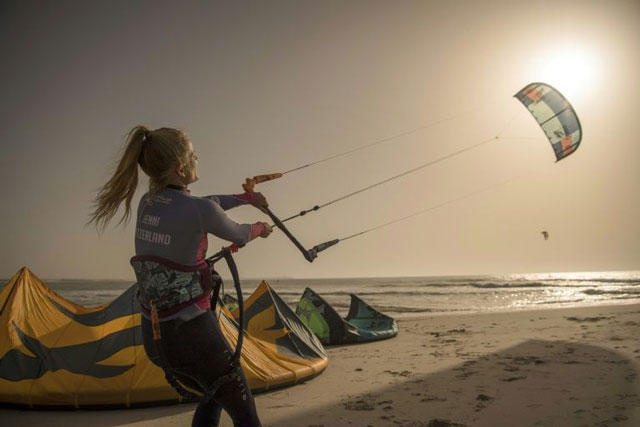
Dakhla, Western Sahara | AFP | In the heart of disputed Western Sahara, a former garrison town has become an unlikely tourist magnet after kitesurfers discovered the windswept desert coast was perfect for their sport.
In Dakhla, an Atlantic seaport town punctuated with military buildings in Morocco-administered Western Sahara, swarms of kitesurfers now sail in the lagoon daily.
“Here there is nothing other than sun, wind and waves. We turned the adversity of the elements to our advantage: that’s the very principle of kitesurfing,” said Rachid Roussafi.
After an international career in windsurfing and kitesurfing, Roussafi founded the first tourist camp at the lagoon at the start of the 2000s.
“At the time, a single flight a week landed in Dakhla,” the 49-year-old Moroccan said.
Today, there are 25 a week, including direct flights to Europe.
“Dakhla has become a world destination for kitesurfing,” said Mohamed Cherif, a regional politician.
Tourist numbers have jumped from 25,000 in 2010 to 100,000 today, he said, adding they hoped to reach 200,000 annual visitors.
The former Spanish garrison is booming today with the visitor influx adding to fishing and trade revenue.
Kitesurfing requires pricey gear — including a board, harness and kite — and the niche tourism spot attracts well-off visitors of all nationalities.
Peyo Camillade came from France “to extend the summer season”, with a week’s holiday costing about 1,500 euros ($1,660).
Only the names of certain sites, like PK 25 (kilometre point 25), ruined forts in the dunes and the imposing and still in-use military buildings in Dakhla, remind tourists of the region’s history of conflict.
In the 1970s, Morocco annexed Western Sahara, a former Spanish colony, and fought a war with the Algeria-backed Polisario Front from 1975 to 1991, when a ceasefire deal was agreed.
A United Nations mission was deployed to monitor the truce and prepare a referendum on Western Sahara’s independence from Morocco, but it never materialized.
Without waiting for the political compromise that the UN has been negotiating for decades, hotels have sprouted from the sand along the coast, and rows of streetlights on vacant lots announce future subdivisions.
– ‘Good communication’ –
“The secret to success is to develop kitesurfing with good communication focused on the organisation of non-political events,” said Driss Senoussi, head of the Dakhla Attitude hotel group.
Accordingly, the exploits of kitesurfing champions like Brazilian Mikaili Sol and the Cape Verdian Airton Cozzolino were widely shared online during the World Kiteboarding Championships in Dakhla last month.
The competition seemed to hold little interest for Dakhla’s inhabitants however.
Only a few young people with nothing to do and strolling families found themselves on the beach for the finals.
Just as rare are the foreign tourists who venture into the town of 100,000 residents to shop.
Like her friends, Alexandra Paterek prefers to stay at her hotel, some 30 kilometres (19 miles) from downtown.
“Here is the best place in the world for learning kitesurfing,” said the 31-year-old Polish stewardess.
On her understanding of the broader regional context, she said: “It’s an old Spanish colony and they have good seafood, for sure.”
Like many tourists, she was under the impression that the area belonged to Morocco, as the destination tends to be marketed in the travel industry as “Dakhla, Morocco”.
That angers the Polisario, which wants independence for the disputed region and tried last year in vain to sue businesses it said were “accomplices to the occupying military power.”
The independence movement is now focused on challenging commercial deals between Morocco and the European Union that involve Western Sahara, according to the group’s French lawyer Gilles Devers.
Moroccan authorities are looking actively for investors for their development projects on the west coast, the most ambitious being the Dakhla Atlantique megaport with a budget of about $1 billion to promote fishing.
– Environmental concerns –
On the lagoon, surrounded by white sand and with its holiday bungalows, “there is a struggle between developing aquaculture and tourism,” said a senior regional representative, who spoke on condition of anonymity.
“One has less impact on the environment, but the other generates more revenue and jobs,” said the representative, adding that “pressure from real-estate investors is very high.”
With the influx of tourists, the protection of the environment has become a major concern.
“Everything is developing so quickly… we need to recycle plastic waste and resolve the issue of wastewater,” said Rachid Roussafi.
Daniel Bellocq, a retired French doctor, worries for the future of this lagoon, that was “once so wild” that he has kitesurfed in for 20 years.
“There is green algae that wasn’t there before, it’s becoming a septic tank,” he said.
Regional councillor Cherif, though, insists the bay is clean, saying: “All the hotels are equipped with wastewater management systems.”
For him, the real threat is from plastic waste, whether it is dropped by tourists or brought by sea currents.
 The Independent Uganda: You get the Truth we Pay the Price
The Independent Uganda: You get the Truth we Pay the Price





